HILDEN Co. Down.
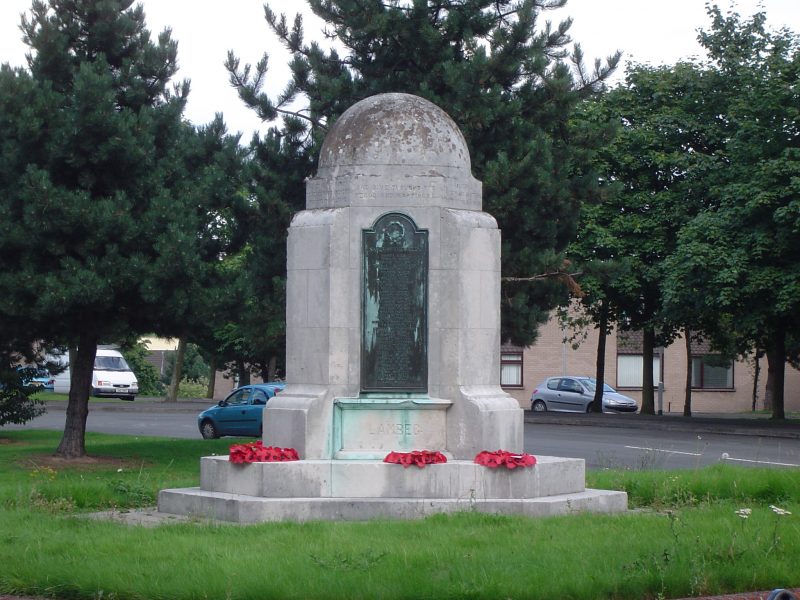
HILDEN, GLENMORE and LAMBEG
In Abiding and Grateful Memory
OF THE
Men of Hilden, Glenmore, and Lambeg.
War Memorial Unveiled by Mrs A. E. Barbour, O.B.E.
Sons of this place, let this of you be said-
That you who live are worthy of your dead;
They gave their lives that you who live may reap
A richer harvest e’re you fall asleep.
In the presence of a large and sympathetic attendance, the memorial erected at Hilden to perpetuate the names of the men of Hilden, Glenmore, and Lambeg, who fell in the war, was unveiled on Saturday afternoon. It was only right and fitting that the honour of unveiling the monument should be conferred upon Mrs A. E. Barbour, O.B.E., who had done so much for our soldiers and sailors in general, and in particular for the local men who volunteered and helped to win the victory. Mr J. Milne Barbour, D. L., M.P., presided.
The entire women of the district are also worthy of all praise for their valuable war services. When the 36th and 16th Divisions started out on their way to the front, the women of Hilden, Glenmore, and Lambeg, who had been following with every sympathetic interest the progress being made by those who had joined up from these localities continued to follow their movements as they went forward for training in England and finally went to France. A guild was formed with the object of collecting funds and sending out parcels and comforts to the men at the front. Mrs Malcolm Gordon, of Hilden, acted as president, and Mrs J. S. Reade, of Glenmore, Lambeg, as treasurer.
Collections were made and entertainments given to raise funds wherewith to provide materials that could be worked up into comforts for the troops, and to obtain suitable presents for enclosure in the parcels. These were then made up and sent out regularly to the front, every possible care being exercised to try and keep in touch with the men individually, and supply them with parcels. The good work was kept up onto the end of the war, when, after meeting all expenses, the guild had on hand out of the fund which they had raised, the sum of £60 1s 3d.
The need for sending parcels to the front having ceased the thought of the guild turned to the memory of those who had given their lives in the great war, and they decided that they would like to see their memory perpetuated by the provision of bronze plaques with the names thereon, which might be placed in some suitable place in the locality.
The project was taken up by a number interested in the neighbourhood, and it was resolved that some suitable memorial should be erected on which the bronze placques could be placed. Messrs Richardson, Sons & Owden, Ltd., very kindly gave the triangular piece of ground formed by the junction of the Low Road and Mill Street at Hilden near the siding. Messrs Blackwood & Jury, architects, Belfast, were commissioned to design the memorial, and the contract for its erection carried out by Mr Robert Mc Henry.
The Memorial.
The memorial is in the form of a hexagon, with semi-circular top, and is of Portland stone, built in ashlar. On three sides it is supported by buttresses, with moulded caps and bases, the alternate sides forming recessed panels on which are placed the names of the fallen on handsome bronze placques, with raised lettering, supplied by the Birmingham Guild, Ltd., the inscription being placed round the top. The monument is 13ft., 6ins., in height from the ground, and is placed on a pedestal formed by two hexagonal steps. There are in all 117 names on the memorial, all of whom had been employed in the three districts. The inscription reads;-
Erected in abiding and grateful memory of the men from Hilden,
Glenmore, and Lambeg, who gave their lives in defence of Empire,
Home, and Liberty in the Great War, 1914-1918.
May the undying memory of their devotion be to all who read the
names an inspiration to serve their country, promote its welfare,
and give thought for peace and happiness.
In the presence of a large and sympathetic attendance, the memorial erected at Hilden to perpetuate the names of the men of Hilden, Glenmore, and Lambeg, who fell in the war, was unveiled on Saturday afternoon. It was only right and fitting that the honour of unveiling the monument should be conferred upon Mrs A. E. Barbour, O.B.E., who had done so much for our soldiers and sailors in general, and in particular for the local men who volunteered and helped to win the victory. Mr J. Milne Barbour, D. L., M.P., presided.
The entire women of the district are also worthy of all praise for their valuable war services. When the 36th and 16th Divisions started out on their way to the front, the women of Hilden, Glenmore, and Lambeg, who had been following with every sympathetic interest the progress being made by those who had joined up from these localities continued to follow their movements as they went forward for training in England and finally went to France. A guild was formed with the object of collecting funds and sending out parcels and comforts to the men at the front. Mrs Malcolm Gordon, of Hilden, acted as president, and Mrs J. S. Reade, of Glenmore, Lambeg, as treasurer.
Collections were made and entertainments given to raise funds wherewith to provide materials that could be worked up into comforts for the troops, and to obtain suitable presents for enclosure in the parcels. These were then made up and sent out regularly to the front, every possible care being exercised to try and keep in touch with the men individually, and supply them with parcels. The good work was kept up onto the end of the war, when, after meeting all expenses, the guild had on hand out of the fund which they had raised, the sum of £60 1s 3d.
The need for sending parcels to the front having ceased the thought of the guild turned to the memory of those who had given their lives in the great war, and they decided that they would like to see their memory perpetuated by the provision of bronze plaques with the names thereon, which might be placed in some suitable place in the locality.
The project was taken up by a number interested in the neighbourhood, and it was resolved that some suitable memorial should be erected on which the bronze placques could be placed. Messrs Richardson, Sons & Owden, Ltd., very kindly gave the triangular piece of ground formed by the junction of the Low Road and Mill Street at Hilden near the siding. Messrs Blackwood & Jury, architects, Belfast, were commissioned to design the memorial, and the contract for its erection carried out by Mr Robert Mc Henry.
The Memorial.
The memorial is in the form of a hexagon, with semi-circular top, and is of Portland stone, built in ashlar. On three sides it is supported by buttresses, with moulded caps and bases, the alternate sides forming recessed panels on which are placed the names of the fallen on handsome bronze placques, with raised lettering, supplied by the Birmingham Guild, Ltd., the inscription being placed round the top. The monument is 13ft., 6ins., in height from the ground, and is placed on a pedestal formed by two hexagonal steps. There are in all 117 names on the memorial, all of whom had been employed in the three districts. The inscription reads;-
Erected in abiding and grateful memory of the men from Hilden, Glenmore, and Lambeg, who gave their lives in defence of Empire, Home, and Liberty in the Great War, 1914-1918.
May the undying memory of their devotion be to all who read the names an inspiration to serve their country, promote its welfare, and give thought for peace and happiness.
At the ceremonial proceedings, which commenced at 3-30, a contingent of ex-Servicemen were drawn up in the form of a square, under the command of Major Wilson.
On the motion of Mrs Malcolm Gordon, seconded by Mrs James S. Reade, the chair was taken by Mr J. Milne Barber, M.P.
The Chairman.
The Chairman said none of those present would deny that during the past six or seven years they had been going through really stirring times. At the close of the last century the Boar War had brought home to their minds that the day of wars had not yet ceased, but it was so far from their homes that-serious as it was-it made little impression on their minds in comparison with a terrible tragedy of the four years from the 4th August, 1914. Even although they had now had close on three years of peace he was sure that those world-shaking events were just as fresh in their memory as though they had only happened yesterday.
When war broke out and they had realised that the struggle upon which they had entered was one which was going to tax the resources of their great world Empire to its very utmost, the men from Lisburn, Lambeg, Glenmore, and Hilden joined up voluntarily in numbers as great as if conscription had been in force. It was to those men that they came there that day to pay their tribute and to show that their patriotism, heroism, and sacrifice were not forgotten. During the war the people who remained at home worked with this steadiness and devotion which he did not think was surpassed in any part of the United Kingdom, and the women, when their work in the factory was done, devoted their hours of recreation and leisure to working for the troops at the front.
When war was over, Lambeg, Glenmore, and Hilden Guild which was formed for sending comforts to the troops, found themselves with some money on hands, and then decided to perpetuate the memory of the men who had given their lives in the struggle. The suggestion thrown out by them was readily taken up. It was felt that the response to such a suggestion should not be due to any outside influence, for no monument-however elaborate-that might be achieved, would be as sincere as one put up by the spontaneous voluntary efforts of those who contributed to its erection.
Names of the Fallen
B.– Walter Baker, Henry Parker Beggs, Samuel Bleakley, James Bowers, David Boyd, Henry Boyd, Edmond Brown, James Brown, John Brown, Samuel Brown, Frederick George Burke, Percy Burke.
C.– John Campbell, Alfred Clarke, John Clay, Thomas Clay, George Cleland, James Coburn, George Connor, Edward Corrigan, Robert Costello, Joseph Cowan, John Curry.
D.– Robert Dennison, Samuel Donegan, Thos. Dougan, Charles Dowds, Hill Dugan.
E.- Cecil E. Ewart, William B. Ewart.
F.- John Fenton, Joseph Ferris, James Fitzsimons.
G.- John Gibson, William Gibson, Wm. Gill, Albert Griffen.
H.- Charles Hamilton, Alexander Hanna, John Hillis, William Hillocks, Jas. Holmes, John Hughes, George Hull, Robert Hull.
I.– James Irvine, Samuel Irvine, William Irvine.
J.- David Williamson Johnston, George Johnston.
K.– Campbell Kennedy, George Kidd, Edward Lewis.
L.- Joseph Lindsay, Richardson Long, John Lundy, Benjamin Lynass, Matthew Lynass.
M.– John Magivern, Patrick Maguiness, David Martin, James Edward Martin, Wm. Matthews, Samuel Millar, Thomas Mines, Robert Morrow, T. J. C. Murdock, Thomas Murphy.
McM.- Robert McCabe, Archibald McCaugherty, James McCallister, James H. McCann, Thomas McCann, Samuel McCaugherty, Thos. McClure, John Patrick McComiskey, James McDowell, John McGurk, William McKeown, John McMillan, John McNair, Thomas C. McShane.
N.– Francis Nagle, James Neill, William Neice.
P.– William Patterson, John Pelan, Wm. Pews, Robert Porter.
R.– Henry Rainey, John Reddock.
S.– Francis Sewell, James Skelly, W. J. Skelly, William Skelly, William Spratt, Jas. Stevenson, Bryce Stewart, Peter Mitchell Stewart.
T.– David Tate, William H. Thompson, Frank Todd, Edward Toole, Samuel Topping, Charles Treanor, James Treanor, Geo. Turner.
W.– George Walker, David Walsh, Thos. Walsh, Joseph D. Webb, Thomas Weir, Alexander Welsh, John Whittle, Robert J. Wills, Samuel Wills, James Woods.

The monument had been erected in their midst, so that the memory of those who had passed along the path of patriotism, devotion, and sacrifice might endure even after those present had passed away. They who knew them would ever treasure their memories, and would hope that those who came after them, and would share in the advantages which their sacrifices had gained, might always mention their names with respect and gratitude.
In the days that lay ahead they trusted that should a call for similar sacrifice ever come there would be men undaunted, dismayed by nothing, who would be ready to take up a righteous cause, prepared to stand for that principal, that high standard of life, and that civilisation, law, and justice that were characteristic of the people of these islands. (Applause.)
Mrs Barbour having proceeded to the memorial, which was enveloped in a Union Jack, Mr P. M. Dury, of Messrs. Blackwood & Dury, handed her a pair of silver scissors in a handsome case, suitably inscribed, with which to perform the ceremony.
The Unveiling Ceremony.
Unveiling the Memorial, Mrs Barbour -speaking with deep feeling said:-I feel greatly touched, as well as honoured, in being given the privilege of unveiling this monument today, to the memory of the men of Hilden, Glenmore and Lambeg. Four years have passed since these men laid down their lives for their country.
We cannot measure yet the result of that sacrifice, but it is clearly left to us to try by our lives to complete the unfinished task they left us, and to make this country, for which they give their all, a larger and more perfect monument to their memory.
And now, because I cannot help but feel the old grief will be revived in many a mother’s heart here today, I should like to read to them a letter from one of the greatest patriots this world has ever produced, Abraham Lincoln, to a mother who had lost five sons in the Great Civil War of America-in the hope that from it they too may derive some comfort; –
“I feel how weak and fruitless must be any word of mine which
should attempt to beguile you from the grief of a loss so
overwhelming. But I cannot refrain from tendering you
the consolation that may be found in the thanks of the country they died
to save. I pray that our Heavenly Father may assure the anguish of
your bereavement, and leave you only the cherished memory of the
loved and lost, and the solemn pride that must be yours to have laid
so costly a sacrifice upon the altar of freedom.”
Lieut.-Colonel Johnston, M.C., said that a very pleasant duty had fallen to his lot that afternoon, for he had been asked to propose that a very hearty vote of thanks be accorded to Mrs. Barbour, who had so graciously unveiled that memorial to the glorious dead of Hilden, Glenmore, and Lambeg. As he was certain, Mrs. Barbour wanted no mere formal tribute in empty words, he would not enlarge upon her generosity, which was well known to everyone in the district and for miles around, but let them think of and speak of those dear ones who left home, business and comfort, went forth to fight and die for the Empire and those they loved. Thiepval, Messines, Ypres, Cambria, St. Quentin, Mons, Kemmell, Passchendaile, and Courtrai, to mention only a few of the corners of war-stricken France and Belgium. These were places that had they tongues to speak, could pay a fitting tribute to those glorious lads whose memory was being honoured that day. Those of them who were fortunate, and who were spared to return, rejoiced to witness that homage to those who fought with them and who died for them. Let us all then endeavoured to live our lives here in that spirit of comradeship, self-help and self-sacrifice that prevailed amongst all classes and creeds in the muddy trenches and sodden plains of Flanders. Of this, he (the speaker) was quite certain, Mrs Barbour would treasure that afternoon amongst the happiest of her busy life. Quite recently he visited a number of towns and villages in various parts of England and Scotland, and was struck by the fact that everyone of them, no matter how small, had its war memorial in a prominent position to tell all who came that way the sacrifices made by the inhabitants in their efforts, a successful one, to preserve intact the shores of our Empire, and the thought struck him, “What of our dead?” Were they less worthy that they had not been remembered? Thanks largely to the munificence of the Barbour family, the memory of our gallant sons and their glorious deeds would live forever, and that monument unveiled that day would speak a message to all who pass. “Live your life as those boys did and die still playing the game.” Concluding, the Colonel said-Mrs Barbour, I am honoured by being asked to convey to you this hearty vote of thanks. Our deepest gratitude will always be yours for this and other good deeds. We are proud that it was your hand that unveiled for all to see this handsome monument to the gallant dead of Hilden, Glenmore, and Lambeg.
Mr Joseph Allen said he felt it a great honour to be asked to second the vote. It was only fitting and right that a member of the Barbour family in the person of Mrs Harold Barbour should perform that ceremony. They were all proud to see that memorial erected to the memory of those gallant men, whom they knew, who had given their lives for the honour and glory of their country; it would be a permanent testimony to the worth and valour of men who died that we might live. It was placed in a very appropriate position where it could be seen daily by those who passed to their employment in the works where most of the men, whose memory they were honouring, had been engaged before going to the war.
The Chairman having conveyed the expression to thanks, Mr Harold Barbour, M.A., replying on behalf of Mrs Barbour, read a letter from the Mayor of Warwick, Lieutenant-Colonel R. Airth Richardson, of Longbridge Manor, Warwick, which contain the following verse:-
Sons of this place, let this of you be said-
That you who live are worthy of your dead.
They gave their lives that you who live near reap
A richer harvest e’re you fall asleep.
Continuing, he said if they were to prove that they were sincere and what they were during that day-if their words were to have any real meaning, if that memorial was to be something more than a mere edifice of stone and metal-they must each of them see to it that in their lives in the future they did nothing either by word or deed to jeopardise in any way that peace and security, to attain which those men died.
Mr J. S. Reade, proposing a vote of thanks to the Chairman, said that Mr Barbour was not alone a great leader, but he was, so to speak, the father of that district.
Mr Malcolm Gordon seconded the proposition, which was passed by acclamation.
Mr Barbour, in reply, said he appreciated very much indeed their kind acknowledgement of any little service he had rendered there that day-a duty which he regarded as a great privilege. Proceeding, he said he felt he should express, on behalf of the people there, their appreciation of the kindly interest and sympathy which had been shown in that effort of theirs, and especially to the ex-Servicemen who had come and paid them that honour. To those immediately concerned in the memorial he hoped it might afford them some consolation in having the names of those near and dear to them inscribed on it. Let them all remember what it stood for- that those men gave their lives for home and country.
The proceedings terminated with the singing of the National Anthem.
Friends and relatives of the fallen soldiers afterwards deposited a large number of beautiful wreaths at the base of the monument-an act which touched the hearts of many present. Mr J. Milne Barbour and Mrs Harold Barbour preceded the bearers of these tributes.
Buglers afterwards sounded the “Last Post.”
Lisburn Standard 4th November 1921
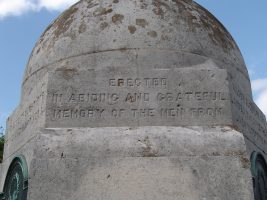
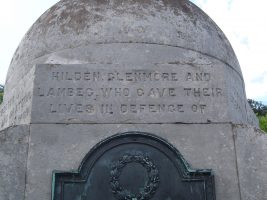
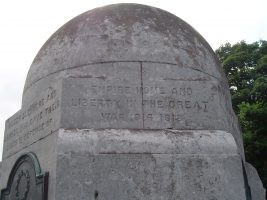
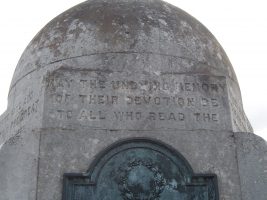
War Trophies.
The following letter, addressed to the chairman, was read: —
Antrim Castle. Antrim.
4th Sept., 1919
Dear Sir, -The chairman of War Office Trophies Committee, has notified me that the Army Council a certain number of unclaimed captured German helmets, rifles machine guns, and a limited number of field guns and trench mortars for distribution.
The chairman has asked me as Lord Lieutenant of the county, to notify him of the places selected for the grant of such trophies.
I should be glad, therefore, if you would kindly inform me whether you are desirous of obtaining any of these war trophies, and if so the number and description of same, and I should be obliged if, at same time, you would give me some information of the war work in your during the past live years.
I desire to point out that these trophies have nothing to do with the trophies claimed by the units in the county, who, I am informed, have been already asked to communicate their wishes, as to the allocation of same direct to the War Office.
The cost of conveyance of the Trophies would be borne by the Government. – Yours faithfully. Massereene and Ferrard. H.M. Lieutenant for Co. Antrim.
Mr. Mockler—1 would acknowledge the letter and say that the Council will be glad to accept some of the trophies.
Mr. Armstrong—Yes, it would be nice to have a gun outside the entrance to this building, and a place could be found in the Boardroom for the helmets and other trophies.
Chairman—If we can get them we might have a gun each at Ballinderry, Glenavy, and Stoneyford. I know Dr. Mussen has applied to Mr. C. C. Craig. M.P., to try and obtain a gun for Glenavy, but it appears they are hard to get.
The Clerk was instructed to reply in harmony with Mr. Mockler’s suggestion.
Lisburn Standard, 26th September, 1919 p5
HILDEN-LAMBEG MEMORIAL.
Mr. J. Milne Barbour wrote: – “The people of above district are anxious to erect a war memorial in memory of the people of the locality who died in the great war. The site would be at the end of the Low Road, where it passes under the Great Northern Railway, at the Hilden Halt, as per sketch herewith. This triangular piece of ground is at present the property of Messrs, Richardson Sons & Owden, who have kindly consented to give the ground for this purpose. I should, therefore, be much obliged if you would kindly advise me of the procedure which should be followed to have this property transferred by Messrs. Richardsond, Sons & Owden, Ltd., to the Lisburn Rural Council, so that the property may be vested in them, and also to know that subject to this being done, we should have the necessary permission to erect the proposed memorial.”
The matter was committed to the solicitor to ascertain the proper procedure, the council at the same time expressing their readiness to give permission for the erection of the memorial.
Lisburn Standard, Friday, 26th November 1920, page 1
If you can supply additional information, photographs of War Memorials in the nine counties of Ulster, or wish to report errors, broken links, make comments, suggestions, requests, etc. please email
uwms@outlook.com
All contributions will be acknowledged.
Research underetaken when time permits.